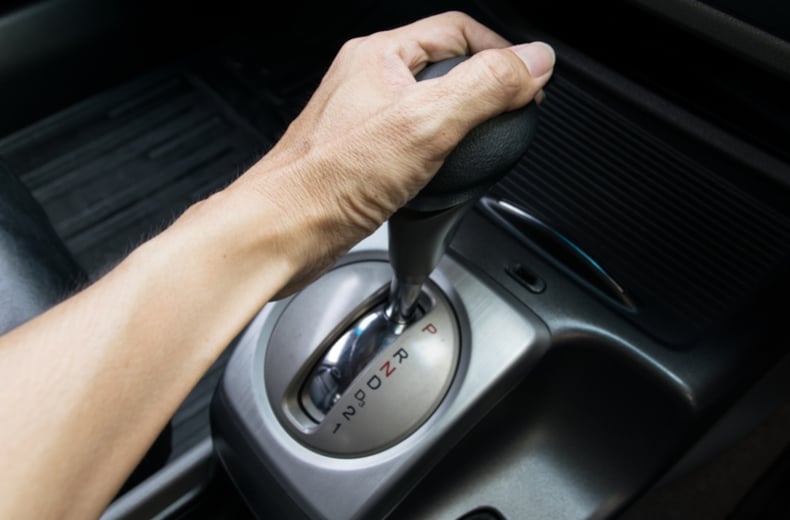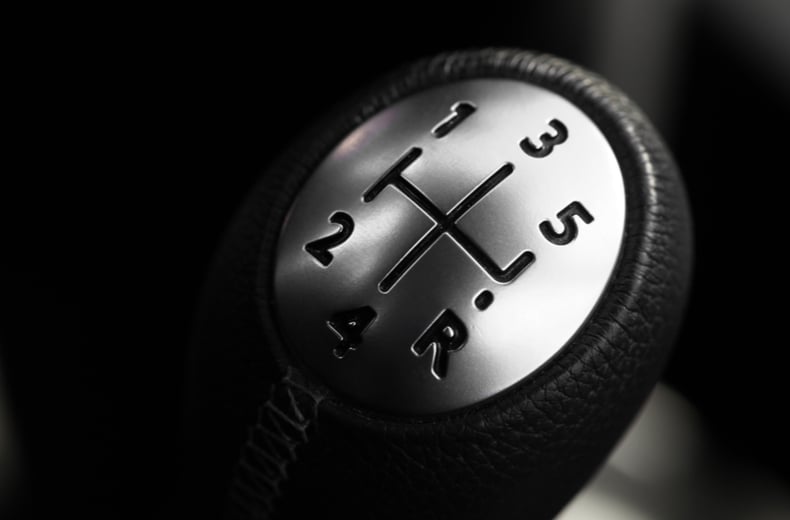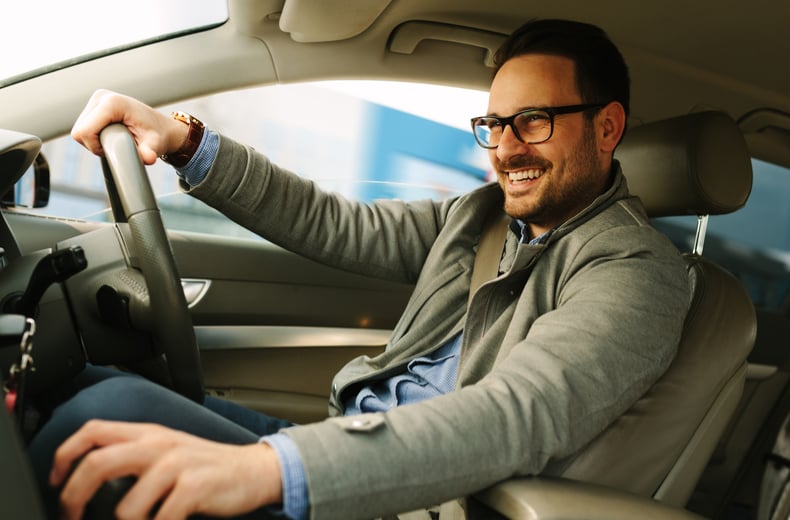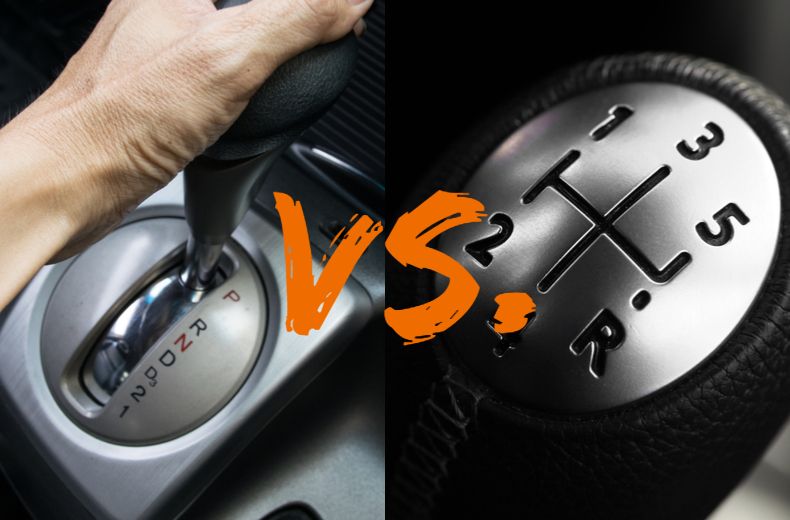Modern vehicles have many new innovations - but these two options are still an important thing to consider when buying your next car. Knowing what they both mean is vital for drivers.
Before choosing your next car, check out our essential guide to the pros and cons of manual and automatic.
What’s the difference between a manual and automatic car?
Let’s begin with the basics – a manual car has a gear system that you operate yourself by moving the gear stick and pressing down the clutch pedal. The majority of vehicles driven in the UK are manual.
An automatic car changes gears for you automatically in relation to the speed you’re travelling and doesn’t have a clutch pedal.
Should I buy an automatic car?

Using a component called a torque converter, automatic transmission does the hard work for you. You only have to worry about going forwards, backwards or stopping. So, how does an automatic compare to a manual?
Pros
- Easier to drive: Many people like automatic cars for their convenience. They’re simple to operate as there’s no clutch to control. Simply select D for Drive and forget about manoeuvring the gear stick until you need to park or reverse.
- Smoother ride: Automatic gearboxes offer a seamless transition between gears, giving you a pleasant ride without any stuttering.
- Better in rush-hour traffic: If you’re forever stopping and starting in congested towns, it can become a chore to constantly pump the clutch pedal. Automatic transmissions require less effort, so you can concentrate fully on navigating tricky junctions and other traffic safely.
Cons
- More expensive to buy: The main disadvantage of automatics is that they generally cost more to buy than their manual counterparts, both new and second-hand, so they’re not ideal if you’re on a budget.
- Boring to drive: Some drivers find that automatics take the fun out of driving. They like the feel of changing gear and having more of a physical connection with their car. And for anyone used to changing gears, it can actually be difficult to adjust to not having a clutch.
When it comes to purchasing a new car, make sure to consider the pros and cons.
Should I buy a manual car?
The majority of motorists in the UK still drive a car with a manual gearbox, but how does it compare to an automatic?
Pros
- Greater control: A manual gearbox gives you more control over the car as you alone choose which gear to use. This can be particularly beneficial in wintry conditions.
- More speed: Some automatics can be slow and cumbersome, although many are now fitted with dual-clutch technology to make them quicker. A manual gearbox is traditionally better at transferring power from your engine to your wheels, so you can accelerate at a faster pace.
- Cheaper to maintain: Manuals generally require less maintenance because they have a less complex design than automatics. Repairs tend to be significantly cheaper – unless the clutch goes.
Cons
- Not as safe: With a manual, you need to take one hand off the steering wheel to change gears. Automatic cars are safer as you can keep both hands on the wheel and concentrate more on the road ahead.
- Leg ache: Constantly working the clutch can become uncomfortable as your left foot never gets a rest, especially if you drive in congested areas. This can lead to aches and pains in your leg muscles.
Are manual cars more fuel efficient than automatics?
It’s a widely-held belief that automatic cars guzzle more petrol than their manual equivalents.
While that used to be the case as older models were fitted with a slow, three-speed transmission, automatic technology has hugely improved in recent years. In many cases, you may even find that you’ll get more miles to the gallon in an automatic.
Is it easier to learn to drive in an automatic car?
Although shifting gears and working a clutch becomes second nature after a while, when you’re learning to drive it can take quite a lot of practice to master this skill. An automatic car makes it easier to focus more on speed and road position – and you can keep both hands on the wheel as you won’t have to change gear.
You’re also unlikely to stall in an automatic – which saves you the embarrassment of making a hash of hill starts or stalling just as the traffic lights change. Stalling an automatic transmission will only occur if there’s a mechanical issue. If you need a diagnostic, repair or vehicle health check, consider using the RAC Approved Garage or a trusted mechanic.
If I learn in an automatic can I drive a manual?
If you’re only licensed for an automatic car, it’s against the law to drive a manual vehicle on public roads. To do this, you’ll need to sit another driving test and upgrade your automatic licence to a manual one.
If you’re licensed to drive a manual car in the UK, you’re allowed to drive an automatic vehicle on public roads.
Are manual cars cheaper to insure?

While there doesn’t tend to be a huge difference in premiums between manual and automatic cars, automatics can be more expensive to insure.
This is typically because automatic gearboxes cost more to replace than manuals and are often found in higher specification vehicles.
It’s worth noting that insurance premiums for drivers who only have an automatic licence are usually considerably higher than for drivers with a full licence.
- RAC Temporary Car Insurance from 1 hour to 30 days
- RAC Learner Driver Insurance from 1 day to 5 months
- Get complete peace of mind at home or at the roadside with RAC Breakdown Cover
Should I drive a manual or automatic abroad?
If you’re hiring a car in Europe, you’re more likely get a manual car, but in the US and Canada it can be difficult to rent a manual because almost everyone drives an automatic.
The cost of a hire car can also be influenced by the transmission type you choose. In the US, Canada, Australia and New Zealand, it’s usually cheaper to hire an automatic vehicle because there’s more supply, while in the UK or Europe the opposite is true.
Will manuals be phased out in the future?
The Government is forging ahead with plans to ban the sale of new petrol and diesel vehicles amid calls to bring forward the current 2040 deadline to 2032.
With the rise in popularity of electric and hybrid vehicles, which don’t have a gearbox so are effectively automatic, it’s anticipated that manual cars could disappear from UK roads within 10 years.
Premium brands such as Ferrari and Porsche have been phasing out manuals for years, but smaller, more affordable cars now come with auto options too, including the Ford Fiesta and Volkswagen Polo.
Looking ahead even further into the future, driverless cars won't feature manual gears either.
Conclusion – is an automatic better than a manual?

The important thing is to choose what you feel most comfortable with but, generally speaking, an automatic car might be best suited to someone who does a lot of urban driving. It’s also a good option for people with a disability or limited mobility.
If you travel longer distances and see driving as more than just getting from A to B, a manual car might be the way to go for a more enjoyable and rewarding drive.

RAC sale – up to 33% off*
• Roadside cover from £5.49 a month†
• We get to most breakdowns in 60 mins or less
• Our patrols fix 4/5 breakdowns on the spot







